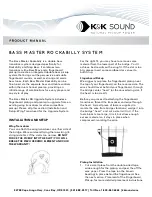SAFETY SUMMARY
The following general safety precautions must be observed during all phases of operation, service and
repair of this instrument. Failure to comply with these precautions, or with specific warnings elsewhere
in these instructions violates safety standards of design manufacture and intended use of the instrument.
Lexicon assumes no liability for the customer's failure to comply with these requirements.
SAFETY SYMBOLS
General definitions of safety symbols used on equipment or
in manuals.
Instruction manual symbol: the product
will be marked with this symbol when it is
necessary for the user to refer to the
instruction manual in order to protect
against damage to the instrument.
Indicates dangerous voltage. (Terminals
fed from the interior by voltage exceed-
ing 1000 volts must be so marked.)
The WARNING sign denotes a hazard. It
calls attention to a procedure, practice,
condition or the like which, if not correctly
performed or adhered to, could result in
injury or death to personnel.
The CAUTION sign denotes a hazard. It
calls attention to an operating procedure,
practice, condition or the like which, if not
correctly performed or adhered to, could
result in damage to or destruction of part
or all of the product.
The NOTE sign denotes important infor-
mation. It calls attention to procedure,
practice, condition or the like which is
essential to highlight.
GROUND THE INSTRUMENT
To minimize shock hazard the instrument chassis and cabi-
net must be connected to an electrical ground. The instru-
ment is equipped with a three-conductor AC power cable.
The power cable must either be plugged into an approved
three-contact electrical outlet or used with a three-contact to
two-contact adapter with the grounding wire (green) firmly
connected to an electrical ground (safety ground) at the
power outlet. The power jack and mating plug of the power
cable meet International Electrotechnical Commission (IEC)
safety standards.
DO NOT OPERATE IN AN EXPLOSIVE
ATMOSPHERE
Do not operate the instrument in the presence of flammable
gases or fumes. Operation of any electrical instrument in
such an environment constitutes a definite safety hazard.
KEEP AWAY FROM LIVE CIRCUITS
Operating personnel must not remove instrument covers.
Component replacement and internal adjustments must be
made by qualified maintenance personnel. Do not replace
components with power cable connected. Under certain
conditions, dangerous voltages may exist even with the
power cable removed. To avoid injuries, always disconnect
power and discharge circuits before touching them.
DO NOT SERVICE OR ADJUST ALONE
Do not attempt internal service or adjustment unless another
person, capable of rendering first aid and resuscitation, is
present.
DO NOT SUBSTITUTE PARTS OR MODIFY
INSTRUMENT
Because of the danger of introducing additional hazards, do
not install substitute parts or perform any unauthorized
modification to the instrument.
DANGEROUS PROCEDURE WARNINGS
Warnings, such as the example below, precede potentially
dangerous procedures throughout this manual. Instructions
contained in the warnings must be followed.
Dangerous voltages, capable of causing death, are pres-
ent in this instrument. Use extreme caution when han-
dling, testing and adjusting.
WARNING
NOTE:
CAUTION
Electrostatic Discharge (ESD) Precautions
The following practices minimize possible damage to ICs
resulting from electrostatic discharge or improper inser-
tion.
•
Keep parts in original containers until ready for use.
•
Avoid having plastic, vinyl or styrofoam in the work
area.
•. Wear an anti-static wrist-strap.
•
Discharge personal static before handling devices.
•
Remove and insert boards with care.
•
When removing boards, handle only by non-conduc-
tive surfaces and never touch open-edge connectors
except at a static-free workstation.*
•
Minimize handling of ICs.
•. Handle each IC by its body.
•
Do not slide ICs or boards over any surface.
•
Insert ICs with the proper orientation, and watch for
bent pins on ICs.
•
Use anti-static containers for handling and transport.
*To make a plastic-laminated workbench anti-static, wash with
a solution of Lux liquid detergent, and allow to dry without rinsing.
CAUTION
WARNING


















